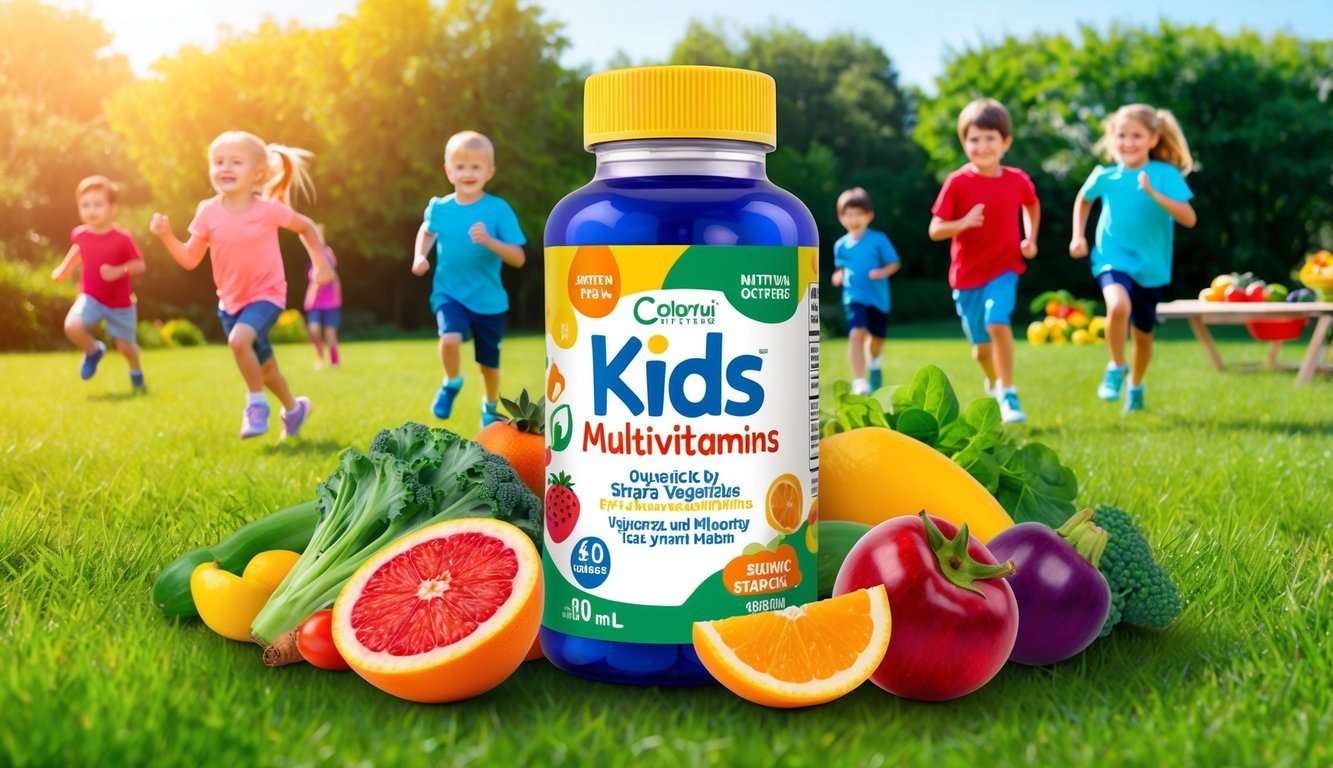Keeping our kids healthy is a top priority for every parent.
It’s essential to know how to support their immune systems, especially as they grow and encounter new challenges, like starting school or joining sports teams. Focusing on practices that strengthen their immunity can make a big difference in their overall well-being.

In my experience, simple lifestyle changes can lead to significant improvements in how resilient our kids are to illnesses.
From nutrition to daily habits, establishing a strong foundation now can help them thrive later on.
Let’s look at some effective strategies to keep our children’s immune systems in tip-top shape.
1) Feed them a rainbow of fruits and veggies
I’ve found that getting kids to eat fruits and vegetables can be a fun challenge.
One approach I love is to encourage them to eat a variety of colors.
Each color offers unique nutrients that help support their immune systems.
For example, red fruits and veggies like tomatoes and strawberries are rich in lycopene.
This nutrient is great for heart health and can even help reduce certain cancer risks.
Then there are orange and yellow options, like carrots and bell peppers.
These are packed with vitamins that boost immunity and help maintain healthy skin.
Don’t forget about green foods, like broccoli and spinach.
They are loaded with essential vitamins and minerals, supporting overall health.
Blue and purple fruits, such as blueberries and grapes, contribute antioxidants that protect against damage.
Incorporating these colorful choices into meals can make eating healthy more appealing.
I try to keep a variety of fresh fruits and veggies on hand.
This way, my kids can easily grab a colorful snack!
Opt for yogurt with live active cultures

When it comes to boosting my kid’s immune system, I always choose yogurt packed with live active cultures.
These good bacteria play a vital role in maintaining gut health, which is closely linked to overall immunity.
Yogurt is a great source of probiotics, specifically strains like L. acidophilus and L. bulgaricus.
I find that these help restore the natural balance of gut flora.
A balanced gut can enhance nutrient absorption and support a stronger immune response.
I look for options that have minimal added sugars.
Some yogurts, like those labeled as skyr or Greek, often provide more protein and fewer carbs.
The thicker texture can also be more appealing to kids.
Introducing yogurt as a regular snack can be an easy and tasty way to support their health.
Whether plain or flavored with fresh fruit, it’s a win-win for both of us.
Plus, it’s packed with calcium and other essential nutrients that contribute to overall health.
3) Make sure they’re getting enough sleep

Ensuring my child gets enough sleep is crucial for their immune system.
Kids need different amounts of sleep based on their age, but generally, 6 to 13-year-olds should get 9 to 11 hours each night.
I try to set a consistent bedtime for my child.
Going to bed and waking up at the same time helps regulate their internal clock.
When they sleep well, their body can focus on fighting off germs and staying healthy.
Creating a bedtime routine has made a big difference.
I avoid screens and stimulating activities before bed.
Instead, we read a book or talk about our day, helping them wind down.
I also prioritize sleep by scheduling it like any other important activity.
Knowing how much sleep they need helps us manage homework and playtime.
By making sleep a priority, I’m setting my child up for better health.
4) Encourage regular handwashing
I can’t stress enough how important handwashing is for keeping my kids healthy.
It’s such a simple practice but makes a huge difference in preventing germs from spreading.
I teach my kids the five easy steps for effective handwashing: wet, lather, scrub, rinse, and dry.
They need to wash for at least 20 seconds, which can feel like a long time for them, so I encourage singing a song to make it fun.
I make handwashing a routine.
We wash our hands before meals, after using the bathroom, and after playing outside.
This consistent practice not only helps them fight off viruses and bacteria but also instills lifelong habits.
Whenever we come home, I remind them to wash their hands to keep any germs at bay.
It’s a great way to protect my family, especially during cold and flu season.
By creating this habit, I can help ensure my kids stay healthy and feel their best.
5) Ensure they get plenty of outdoor playtime

Getting kids outside to play is essential for their health.
I’ve seen how outdoor play boosts not only physical activity but also mood and social skills.
Fresh air and sunshine can play a big role in keeping their immune systems strong.
Sun exposure helps our bodies produce vitamin D, which is crucial for many functions, including supporting the immune system.
This vitamin plays a key role in bone development and overall health.
I love watching my kids run, jump, and climb.
Outdoor play encourages them to explore and take risks, which helps build confidence and resilience.
They learn valuable life skills while having fun.
It’s also a great opportunity for them to socialize.
Playing with friends fosters connections and helps them develop interpersonal skills.
Encouraging regular outdoor activities can prevent illness and promote well-being.
So, I make sure to carve out time in our daily routine for outdoor adventures, whether it’s a trip to the park or simply playing in the backyard.
6) Offer a multivitamin designed for kids

When it comes to supporting my child’s immune system, adding a multivitamin can be a smart choice.
Kids often have picky eating habits, which means they might not get all the nutrients they need from food alone.
I look for multivitamins specifically formulated for children.
These usually contain essential vitamins like A, C, D, and zinc, which are vital for immune function.
For example, I’ve found gummy options that appeal to my child’s taste, making it easier for them to take their daily dose.
It’s also important to consider the age and specific needs of my child when choosing a multivitamin.
Some brands focus on toddlers, while others cater to older kids.
Whenever possible, I consult with my pediatrician to ensure I’m making informed decisions.
By incorporating a good multivitamin into my child’s routine, I feel more confident that they are receiving the vital nutrients necessary to help keep their immune system in top shape.
Understanding the Immune System
I think it’s fascinating how our kids’ immune systems work to keep them healthy.
Knowing the components and how they adapt over time can help us support their defenses effectively.
What Makes Up Your Kid’s Immune System?
Your child’s immune system is a complex network that protects against germs and illness.
It includes various components:
- White Blood Cells: These are the frontline defenders that identify and eliminate invaders.
- Antibodies: Proteins created by the immune system that specifically target pathogens.
- Lymphatic System: This includes lymph nodes and vessels that transport immune cells around the body.
- Bone Marrow: Responsible for producing new blood cells, including white blood cells.
- Spleen and Thymus: Organs that help produce and mature immune cells.
Together, these elements ensure that when a virus, bacteria, or toxin enters the body, a swift and effective response is initiated.
How the Immune System Evolves Over Time
As children grow, their immune systems develop and strengthen through various experiences.
Early exposure to germs plays a crucial role:
- Infancy: Newborns rely on maternal antibodies for protection.
- Childhood: Regular contact with other kids, especially in daycare or school, exposes them to diverse pathogens, helping to build immunity.
- Vaccinations: Administered at key developmental stages, vaccines stimulate the immune system to recognize and fight specific germs without causing disease.
This gradual exposure helps shape a robust immune response that is critical for long-term health.
It’s all about fostering experiences that enable my child’s immune defenses to adapt and thrive.
Daily Habits for a Strong Immune System

To keep my kid’s immune system strong, daily habits play a vital role.
Focusing on balanced nutrition and ensuring they get enough sleep can significantly impact their health.
Here’s how these aspects benefit their immunity.
A diet rich in fruits, vegetables, and whole grains provides essential vitamins and antioxidants that help strengthen their immune defenses.
Adequate hydration and regular physical activity also contribute to overall well-being and support healthy liver function, which is crucial for detoxification and metabolism.
By maintaining these habits, I can help ensure my child stays energetic and resilient against common illnesses.
Balancing Nutrition and Diet
I make it a priority to include a variety of foods in my kid’s diet.
Nutrients from fruits, vegetables, whole grains, and lean proteins provide essential vitamins and minerals.
Here’s a quick list of immune-boosting foods to add to their plates:
- Fruits: Oranges, berries, and kiwi offer vitamin C.
- Vegetables: Spinach and broccoli are packed with antioxidants.
- Proteins: Lean meats, fish, and legumes support growth and repair.
I also limit processed foods and sugars, as they can weaken the immune system.
Planning meals together makes it fun, and they’re more likely to enjoy nutritious options.
A well-rounded diet not only protects against sickness but also helps them thrive.
Importance of Sleep and Rest
Sleep is crucial for boosting my kid’s immune system.
When they get enough quality sleep, their bodies can fight off illnesses more effectively.
I aim for:
- Ages 1-2: 11-14 hours total sleep
- Ages 3-5: 10-13 hours
- Ages 6-13: 9-11 hours
Creating a bedtime routine helps them wind down.
I find that limiting screen time before bed makes a big difference.
Soft lighting and quiet activities, like reading, set the mood for restful sleep.
Resting during the day is just as important.
Short naps can help recharge their energy and improve focus.
Prioritizing both sleep and rest helps keep their immune system and mood in check.
Recognizing Changes in Immunity

I’ve learned that keeping an eye on my kid’s immune system is really important.
Changes in their immune function can show up in various ways.
Some signs that could indicate a shift in immunity include:
-
Frequent Illness: If my child seems to catch colds or infections more often, it might be a red flag.
-
Unusual Fatigue: If they’re more tired than usual, even after a good night’s sleep, it could point to an issue.
-
Skin Issues: Rashes, unusual bruising, or other skin problems can sometimes signal underlying immune problems.
-
Digestive Upset: Changes in appetite or persistent stomach issues may also be linked to immune health.
I find it helpful to keep a close watch on these signs and track any patterns.
When I notice a combination of these symptoms, it’s a good idea to consult with a healthcare professional.
Nurturing my child’s immune system isn’t just about boosting it.
It’s also about understanding what their body is telling me.
By staying informed and proactive, I can help support their health in a positive way.

